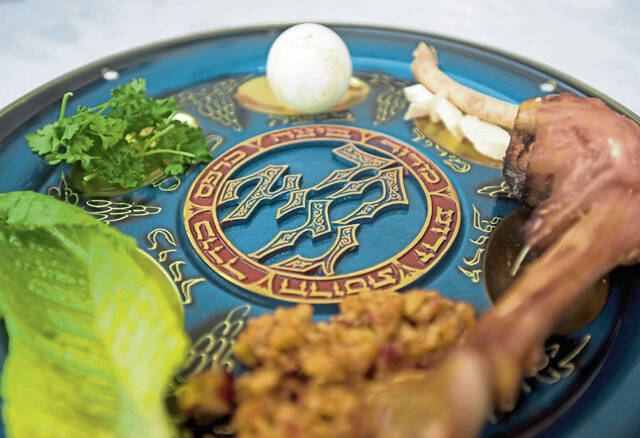Shari Lowenstein Zatman of O’Hara is entering Passover with a mix of emotions this year.
“I definitely feel like we’re observing Passover with a heavier heart this year. ’Let My People Go’ is something we say as part of the holiday and it’s taken on a relevant meaning with our hope for the release of the hostages in Gaza,” Zatman said.
Passover is one of the most sacred holidays observed by the Jewish faith, but the realities of the ongoing Israel-Hamas war in Gaza and the increase in antisemitic incidents nationwide are at the forefront of many Jews’ minds as Passover begins at sundown Monday.
Passover, or Pesach in Hebrew, is one of three pilgrimage festivals in Judaism. Passover commemorates the deliverance of ancient Hebrews from slavery in Egypt and refers to God “passing over” the houses of Israelites, sparing their children while killing the firstborn of the Egyptians.
Rabbi Yaier Lehrer of Adat Shalom of Indiana Township busily prepared Monday afternoon for a Seder as he reflected on the unfortunate new normal for synagogues throughout Pittsburgh.
“We have security here for our Seder tonight,” Rabbi Lehrer said. “The reality here is we’ve had security ever since the Tree of Life Shooting.”
Lehrer described a few of the 15 steps observed by Jews during the Seder, which he explained is “the meal to remember where we came from and the concept and freedom.”
“We want to come together in a very holy but social way, and our message here is to celebrate who we are,” Lehrer said.
Eating matzo, unleavened bread, is one of the Seder traditions, and bitter herbs are eaten to remind the people of the pain that the Jews endured.
During the Seder, a hard-boiled egg and vegetable are dipped in salt water, which represents tears. The egg represents the cycle of life and the vegetable represents spring.
Many Jewish communities and families read the Haggada, a guidebook for the Seder.
Most synagogues in the U.S. observe Passover for eight days, but some synagogues follow a seven-day timeline, according to Lehrer.
A Seder (which means order) is a ritual meal in which the plate traditionally holds items symbolizing a part of the Passover story.
Karpas (a green vegetable), charoset (sweet fruit), maror and chazeret (bitter herbs), zeroa (shank bone) and beitzah (egg) typically round out the Seder plate.
Lehrer’s message Monday was one of resilience.
“Our message is to celebrate who we are. We’ve come a long way for thousands of years and it commemorates the creation of a Jewish nation. We have to celebrate that and in difficult times it’s very important to remember who we are and stand up for who we are,” he said.
For Zatman, surrounding herself with friends from the Jewish community is especially important right now.
“This year, even more so, for the feeling of closeness and support for one another,” Zatman said.
Lehrer added that the ongoing support to the Jewish community hasn’t gone unnoticed.
“We have a new reality, but at the same time, we’ve heard from so many people that support us. People outside of the Jewish community have been very supportive.”
Laurie MacDonald, CEO of Center for Victims, based on the South Side, expressed unwavering support Monday for the Jewish community during what she described as a sacred time of Passover.
“I’m heartbroken by the victimization of Jews for so long,” MacDonald said.
Center for Victims has donated $2.2 million to victims and those affected in the aftermath of the Tree of Life massacre on October 27, 2018, when 11 worshipers were killed inside a Squirrel Hill synagogue in the deadliest attack on Jews in the U.S.
“The Center for Victims has been steadfast in its commitment to providing resources, support and advocacy for our Jewish friends and neighbors, victims of this heinous crime. As we remember this solemn event, we also acknowledge the horrific attacks by Hamas on Israel and the rise of antisemitism worldwide,” MacDonald said.
“We stand in solidarity with the Jewish community during Passover, a time of liberation and hope, as we continue to work towards a future free from violence.”








